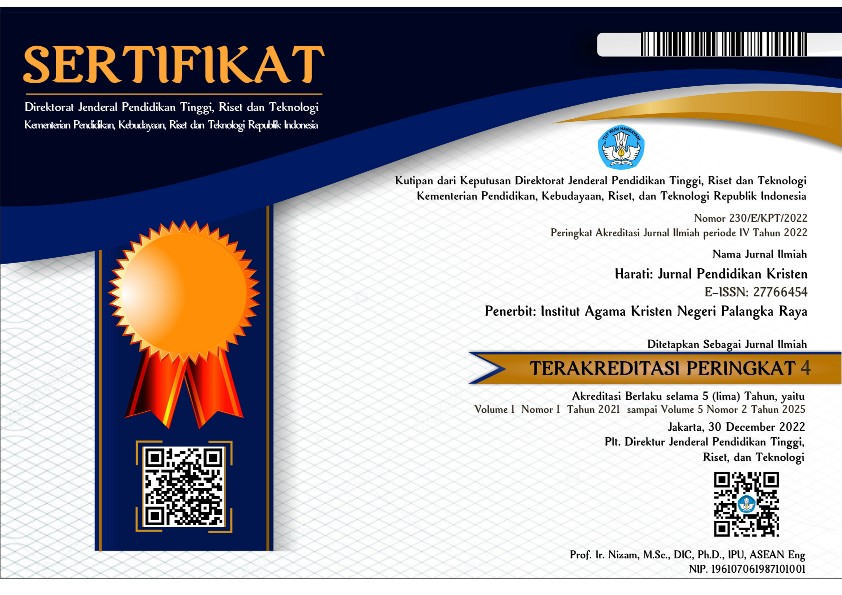The Role of Christian Teachers based on Denpasar Local Wisdom in Developing Connectivist Learning in the Era of Digital Transformation
DOI:
https://doi.org/10.54170/harati.v5i1.756Keywords:
christian teachers, connective learning, digital transformation eraAbstract
This study aims to find out the role of Christian teachers in Denpasar in developing communicative learning in the era of digital transformation as well as the most significant factors that affect the role of teachers in the development of learning. The research method used was an explanatory survey, using a questionnaire distributed to 47 Christian teachers in Denpasar. The data obtained were analyzed using a regression model to evaluate the relationship between various teacher roles (as facilitators, knowledge curators, promoters of diverse perspectives, promoters of lifelong learning, promoters of collaboration, technology guides, and evaluators of learning connections) and the development of connective learning. The results of the study show that the role of Christian teachers in Denpasar in developing connective learning in the era of digital transformation has been going well and the role of teachers as promoters of collaboration and social learning is the most significant role in developing connective learning.
References
Abraham, N. (2015). Belajar Menjadi Mudah.
Al-Maawali, W. (2022). Integrating Critical Thinking into Digital Connectivism Theory: Omani Pre-service Teacher Development. Language Teaching Research Quarterly, 32. https://doi.org/10.32038/ltrq.2022.32.01
Alam, A. (2023). From Teacher-Centered To Student-Centered Learning: The Role of Constructivism and Connectivism in Pedagogical Transformation. Journal of Education, 11(2).
Coronado, S. (2018). Technology Adoption and Connectivism. Technology and the Curriculum: Summer 2018.
Downes, S. (2012). Connectivism and connective knowledge: Essays on meaning and learning networks. National Research Council Canada.
Dunaway, M. K. (2011, November). Connectivism: Learning theory and pedagogical practice for networked information landscapes. Reference Services Review, Vol. 39, pp. 675–685. https://doi.org/10.1108/00907321111186686
Dziubaniuk, O., Ivanova-Gongne, M., & Nyholm, M. (2023). Learning and teaching sustainable business in the digital era: a connectivism theory approach. International Journal of Educational Technology in Higher Education, 20(1). https://doi.org/10.1186/s41239-023-00390-w
Edwin. (2012). Kualitas Guru Kristen dalam Proses Pembelajaran di Sekolah Kristen sebagai School of Biblical Worldview terhadap Guru-Guru Kristen di Sekolah Kristen se-Bali. STT Kingdom Bali.
Edwin. (2022). Panduan Lengkap Pemuridan: Menjadi dan Menjadikan Murid Kristus (2nd ed., Vol. 1). Denpasar: Moody Publishers.
Fios, F., Sasmoko, & Gea, A. A. (2016). Neuro-research method: A synthesis between hermeneutics and positivism. Advanced Science Letters, 22(9). https://doi.org/10.1166/asl.2016.7565
Greenwood, A. (2023). Librarians as Teachers: A Reflection on Practice, Identity, and the TPACK Framework to Enhance Professional Practice. Journal of the Australian Library and Information Association, 72(2). https://doi.org/10.1080/24750158.2023.2192893
Harefa, A. (2020). Peran guru Kristen dalam membentuk karakter iman peserta didik di era digital. Jurnal Pendidikan Agama Kristen, 8(2), 123–134.
Hutagalung, Y. (2021). Integrasi nilai Kristiani dalam pendidikan karakter di sekolah. Jurnal Teologi dan Pendidikan Kristen Indonesia, 3(1), 45–60.
Johansson, J., Contero, M., Company, P., & Elgh, F. (2018). Supporting connectivism in knowledge based engineering with graph theory, filtering techniques and model quality assurance. Advanced Engineering Informatics, 38, 252–263. https://doi.org/10.1016/j.aei.2018.07.005
Khafaga, A., & Al-Johani, H. M. (2024). The Impact of Virtual Learning on Students’ Engagement in the Saudi EFL Context: A Connectivism-Theoretic Perspective. World Journal of English Language, 14(3), 504–520. https://doi.org/10.5430/wjel.v14n3p504
Lase, D., Daeli, D. O., Ndraha, A., & Harefa, J. (2021). Skills and Competencies of Christian Religious Education Teachers in the Industrial Revolution 4.0 Era. SSRN Electronic Journal. https://doi.org/10.2139/ssrn.3904632
Masengwe, G., & Dube, B. (2023). Retrospective and Prospective Approaches to Christian Education in Church of Christ Schools in Zimbabwe. Religions, 14(9). https://doi.org/10.3390/rel14091120
Priyatno, D. (2012). Belajar Cepat Olah Data Statistik dengan SPSS (1st ed.; Ridwan, Ed.). Yogyakarta: Penerbit Andi.
Reese, S. A. (2015). Online learning environments in higher education: Connectivism vs. dissociation. Education and Information Technologies, 20(3), 579–588. https://doi.org/10.1007/s10639-013-9303-7
Siemens, G. (2005). Connectivism: A learning theory for the digital age. International Journal of Instructional Technology and Distance Learning, 2(1), 3–10.
Shamina, O., & Starodubtsev, V. (2015). Content Curators as the Actors in Educational Events. Procedia - Social and Behavioral Sciences, 214. https://doi.org/10.1016/j.sbspro.2015.11.711
Tari, E., & Hutapea, R. H. (2020). Peran Guru Dalam Pengembangan Peserta Didik Di Era Digital. Jurnal Kharisma, 1(1), 1–13. Retrieved from http://jurnalsttkharisma.ac.id/index.php/Kharis/article/view/1
Tham, J., Duin, A. H., Veeramoothoo, S. (Chakrika), & Fuglsby, B. J. (2021). Connectivism for writing pedagogy: Strategic networked approaches to promote international collaborations and intercultural learning. Computers and Composition, 60. https://doi.org/10.1016/j.compcom.2021.102643
Transue, B. M. (2013). Connectivism and Information Literacy: Moving From Learning Theory to Pedagogical Practice. Public Services Quarterly, 9(3), 185–195. https://doi.org/10.1080/15228959.2013.815501
Vas, R., Weber, C., & Gkoumas, D. (2018). Implementing connectivism by semantic technologies for self-directed learning. International Journal of Manpower, 39(8), 1032–1046. https://doi.org/10.1108/IJM-10-2018-0330
Weeler, S. (2015). Learning with “e”s: Educational Theory and Practice in the Digital Age. Crown House Publishing.
Downloads
Published
License
Copyright (c) 2025 Edwin Wayan

This work is licensed under a Creative Commons Attribution 4.0 International License.







